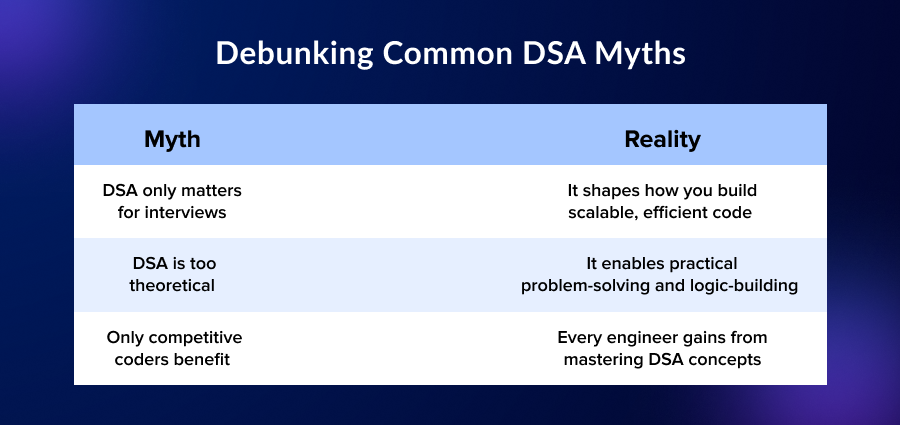Still Ignoring DSA? This Might Be Why You’re Not Landing Top Tech Jobs

Ever heard that 80% of students fail top tech interviews, not because they can't code, but because they lack structured problem-solving skills? That’s the gap. And Data Structures and Algorithms (DSA) fill it. You might think DSA is outdated with the rise of AI, low-code platforms, and full-stack tools.
But here's the truth: DSA remains the foundation of solid software engineering. Whether you're debugging, scaling a backend, or building a mobile app, DSA helps you think better, code faster, and solve problems smarter. Let’s explore in today’s blog post why overlooking DSA might be silently slowing your growth, and what you can do about it.
DSA Isn’t Just for Interview Prep
Think DSA is just for cracking coding rounds? Think again. DSA has deep roots in computer science and modern engineering. It’s not about solving puzzles on LeetCode, it’s about:
- Building efficient systems
- Managing memory and processing speed
- Creating a scalable backend architecture
- Optimizing performance for real-world applications
Tech companies use DSA principles daily. It's the hidden layer behind your code that ensures everything runs efficiently.
Real-World DSA Applications: Beyond Textbooks
Let’s bring this to life with real examples of DSA for software engineers:
- Netflix leverages matrix factorization and deep learning-based collaborative filtering techniques, while graph-based models are actively explored in research for further enhancing recommender systems.
- Uber relies on trees and heaps for real-time ride matching and event prioritization.
- WhatsApp leverages hash maps and queues for quick message delivery across millions.
Whether it’s data retrieval, search optimization, or load balancing, trees, heaps, graphs, and dynamic programming power it all.
DSA Builds Smarter Problem-Solvers
DSA teaches you one thing above all: how to think in terms of efficiency.
Here’s what that means:
- Choosing the right data structure to reduce load time
- Optimizing algorithms to save memory
- Understanding time-space complexity to build faster applications
- Hash tables for faster DB queries
- Queues for live UI updates
- Balanced trees for managing user data at scale
In short, DSA helps you write cleaner, faster, and smarter code.
DSA Across Software Domains
The versatility of DSA is what makes it so powerful. Here’s how different tech domains use it:
Full-Stack Development- Searchable UIs use tries or trees
- Dynamic rendering requires optimized data handling
- Neural networks use graph structures
- Sequence alignment uses dynamic programming
- Chat synchronization uses queues
- Navigation uses graph traversal
- Memory allocation and process scheduling rely on advanced algorithms
What Hiring Managers Actually Look For?
Think knowing five programming languages impresses recruiters? Not really.
Here’s what they look for:
- Structured problem-solving
- Logical thinking
- Ability to scale systems
Tech giants like Google, Microsoft, Atlassian, and Netflix still assess DSA in their interviews, and for good reason. DSA is a predictor of how you think and how well you can build scalable systems in the real world.
Debunking Common DSA Myths

How to Learn DSA the Right Way
Let’s be honest, grinding 500 LeetCode problems can feel overwhelming and directionless.
Instead, take a structured approach:
- Start with the basics: Arrays, Stacks, Queues, Linked Lists
- Move to intermediate: Trees, Heaps, Hash Tables
- Advance to complex: Graphs, Tries, Dynamic Programming
That’s where SkillStone’s hands-on DSA training helps. It’s not just another theory-heavy course. It focuses on real-world use cases that match what engineers face in the field.
Check out SkillStone’s Project-Based DSA Program and start applying concepts in portfolio-worthy projects.
Conclusion
Skipping DSA may not hurt you today, but it will limit your future as a software engineer. Whether you're building mobile apps, optimizing backend systems, or venturing into ML, DSA is at the core.
Mastering it won’t just help you clear interviews, it’ll help you:
- Code smarter
- Solve problems faster
- Land better roles
Start your journey with SkillStone’s DSA Masterclass and develop real-world engineering skills that make your resume stand out. Get Started!
FAQs
Why is DSA still important for software engineering jobs in 2025?Because companies still rely on efficient code and system logic to build reliable, scalable software.
How is DSA used in real-world software development projects?From optimizing search results to speeding up app performance and scaling backend systems, it’s everywhere.
Is DSA only for interviews?No. It's equally useful for performance tuning, architecture planning, and writing maintainable code.
Which tech companies focus heavily on DSA during hiring?Google, Netflix, Microsoft, Atlassian, Uber, all use DSA rounds as a core part of the hiring process.
How can mastering DSA improve your efficiency?It helps reduce time and space complexity, manages memory better, and builds logic-driven applications.
Best way to start learning DSA?Follow a structured path. Begin with basics, progress to real-world problems, and join hands-on programs like SkillStone’s DSA course.
Is DSA useful for app or full-stack developers too?Absolutely. DSA helps make your UI faster, logic tighter, and architecture scalable
Previous post
Top Full Stack Development Trends for 2025 That Every Student Should Know
You may also like

UI vs UX Design: The Difference Every Designer Should Know in 2026

What Marketers Must Own in an AI-Driven Marketing Landscape

